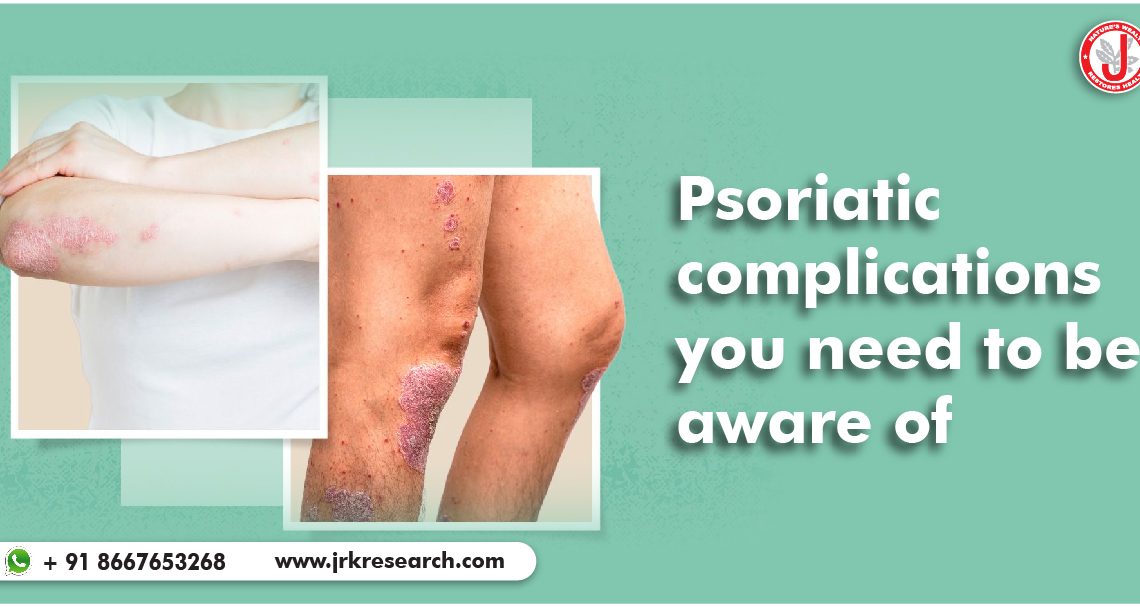

Psoriasis is an autoimmune inflammatory disease. It often appears as a skin condition, but it is a systemic condition that can possibly affect many parts of the body.
There are many different types of psoriasis, and its complications.
Continue reading to learn more about some of the difficulties that may arise as a result of this condition.
Scientists have looked at possible links between psoriasis and inflammatory bowel disease (IBD), Crohn’s disease, and ulcerative colitis.
Crohn disease frequently causes the infiltration and destruction of all intestinal wall layers along the digestive tract, while ulcerative colitis primarily involves the colon and rectum, with mucosal and submucosal invasion. Patients with IBD often experience recurrent loss of appetite, vomiting, diarrhea, abdominal pain, rectal bleeding, and body weight loss
Genetic correlation between psoriasis and IBD, including chromosomal locus 6p21 and the IL23R and IL12B genes, has been identified. As to the shared immunologic features, increased levels of IL-17 were found in both IBD and psoriasis
Psoriasis and IBD have various genetic factors in common. which is why its been a possible complication of psoriasis
Severe psoriasis has been associated with nutritional deficiencies because of an accelerated loss of nutrients, in particular of vitamin D, from the hyper proliferation and desquamation of the epidermal layer of skin.
Foods rich in vitamin D& supplements can be taken to reduce the deficiency
besides its topical use, oral vitamin D supplementation represents an important adjunctive treatment option for psoriatic patients
vitamin D supplementation might be very important for the prevention of psoriasis-related comorbidity, hypertension and metabolic syndrome.
Psoriatic arthritis
Up to 30% of people with psoriasis may develop psoriatic arthritis (PsA).
It usually appears between the ages of 30–50 years.
Symptoms include
- fatigue
- pain and swelling over the tendons
- swollen fingers and toes
- reduced mobility
- stiffness and pain in one or more joints
- pitted nails
- uveitis, a type of eye inflammation
Psychological and emotional consequences
Living with psoriasis can be difficult, and it can have emotional and social consequences.
psoriasis as a “common, long-term skin condition associated with high levels of psychological distress and considerable life impact.
People who have visible lesions may feel embarrassed by their appearance. This can lead to isolation, depression, and anxiety.
there may also be physiological reasons for the psychological impact of psoriasis.
hormonal imbalances caused by adrenal and pituitary can impact both the skin and the psychological well-being of a person with psoriasis.
Stress and worry, in turn, can make symptoms worse. Proper consultation and guidance of your doctor can help you overcome stress.
Metabolic syndrome
Among people with psoriasis, there is a higher risk of some of the symptoms of metabolic syndrome, including heart problems, diabetes, fatty liver disease, and obesity.
pathophysiology linking psoriasis and metabolic syndrome may involve overlapping inflammatory pathways and genetic predisposition.
Chronic Th-1 and Th-17-mediated inflammation with dysregulation of cytokines, e.g. tumor necrosis factor-α and interleukin-6, not only promotes epidermal hyperplasia in psoriasis, but may also antagonize insulin signaling, alter adipokine expression, and mediate insulin resistance and obesity.
People with moderate to severe psoriasis should undergo testing for these conditions so that they can receive preventive treatment in prior.
Body temperature regulation
Some types of psoriasis can affect body temperature regulation. This can have an impact on internal organs, such as the heart and the kidneys
The skin is important for keeping the body temperature stable, and problems that affect the skin can also affect temperature, especially with more severe forms, such as erythrodermic and pustular psoriasis.
Eye complications, such as uveitis, are associated with psoriatic arthritis.
People with psoriasis may experience the following eye complications:
- conjunctivitis
- dry eye
- episcleritis
- blepharitis
- cataracts
- corneal lesion
People with psoriasis should see an eye doctor for regular checkups.
Type 2 diabetes
Psoriasis can also increase your insulin levels and eventually lead to type 2 diabetes. This means your body has become insulin resistant and can no longer convert glucose to energy. The risk of developing type 2 diabetes is higher in cases of severe psoriasis.
Reducing your risk
Genetics and lifestyle factors can also play a role in the development of psoriasis complications. If there’s a disease that runs in your family, like high cholesterol, early detection is key to get the treatment needed to manage the condition. psoriasis complications can be minimized by staying as active as you can, managing stress, and eating a healthy diet. Quitting alcohol and smoking are other lifestyle choices that can help prevent psoriasis from worsening
Get the psoriatic range of products like Dr.JRK’s 777 oil , Psorolin oil , Psorolin derma skin care soap, PESIN tablets , 1-3-2 psorasis kit and psorolin B ointment for effective management of psoriasis and its progression








